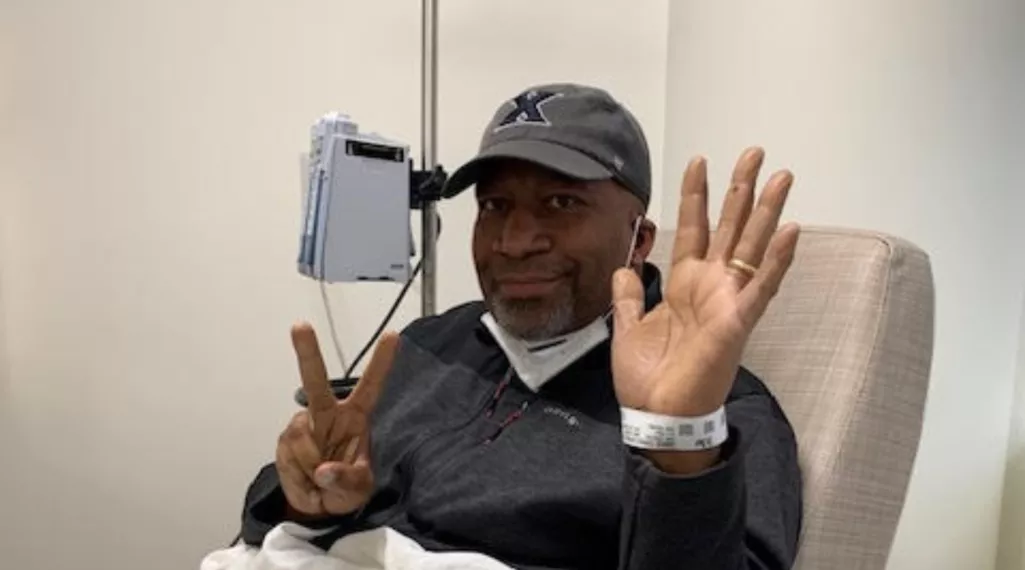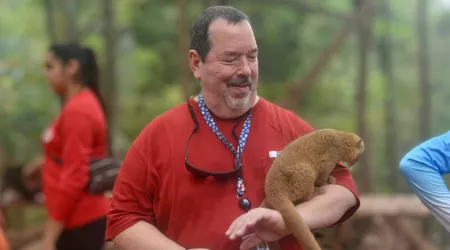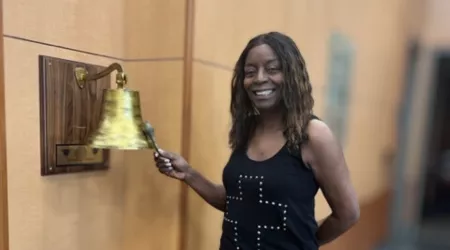
Chris Amos: a patient in a family of survivors

Chris Amos, a stage II colon cancer patient, is a glass-half-full-kind-of-guy. While some might consider themselves unlucky to have both of their parents diagnosed with cancer, Chris knows how lucky he is to come from a family of survivors.
Though facing a colorectal cancer (CRC) diagnosis isn’t easy, Chris continues to show up with grace and courage as he moves through his journey to wellness. By sharing his story, Chris hopes to raise awareness about CRC and change the trajectory of this disease moving forward.
Ignoring Family History
Just weeks before Chris’ 51st birthday in 2021, a colonoscopy he was reluctant to have led to a stage II colon cancer diagnosis.
“I knew cancer ran in my family, even though it wasn’t CRC,” Chris said. “I’d always had minor GI issues and sensitivity, but honestly never thought anything of it. Because of my family history of cancer, my doctor had been encouraging me to get a colonoscopy for years. When I finally agreed, receiving a cancer diagnosis wasn’t something I expected.”
In January of 2022, Chris completed his colon resection, after which no evidence of disease (NED) was found. However, unlike his initial reluctance to ignore tests that could lead to early diagnosis and even prevention, Chris decided to do things differently.
“I found out about the Signatera test, and I decided to take things seriously this time,” Chris said. “I wanted to be as proactive as I could.”
Signatera Test Detects Missed Evidence of Cancer
Provided by Natera, Signatera is a personalized molecular residual disease (MRD) test designed to reveal cancer still present in the body. Because other diagnostics are unable to detect such microscopic evidence of disease, MRD tests may assist in oncology detection and inform treatment decisions as a result.
“What’s great about Signatera is they can create a custom test based on your DNA,” Chris said. “Because of this test, I was able to find out that I still had trace amounts of cancer in my body when all of my negative scans would have indicated otherwise. This allowed my doctors and I to make more informed decisions about my treatment.”
While MRD testing can be reassuring, it can also be anxiety-inducing. Chris opens up about his thought process behind this diagnostic tool.
“I have a mixed bag of feelings about the test,” Chris said. “Overall, I’m glad and feel grateful that it’s available to me. It’s so important to catch things early when it comes to fighting cancer. The challenge is, it can increase your anxiety. Even still, I think it’s better to know than to not know. Being under more frequent surveillance from my doctors allows me to stay on top of my treatment with greater chances of success.”
While Chris’ scans showed no evidence of disease, the Signatera test revealed further traces. Because of this, Chris opted to complete six months of chemotherapy treatments.
A Thriver From a Family of Survivors
While Chris has yet to receive a 100% NED diagnosis, he is optimistic about his ability to stay on top of cancer treatment and not just survive, but thrive. His support system and family have a lot to do with that.
“I feel so fortunate,” Chris said. “My mother is a breast cancer survivor, and my father beat a very aggressive lung cancer that he was not expected to survive. He would always say to me, ‘You’ve got the genes to beat this.’ While my father is no longer with us, I’m so happy he got to see me finish treatment and witness my numbers improving.”
Not only does Chris find comfort in where he comes from, but he also resources a lot of strength from his wife and two kids.
“It’s not solely my thing to endure,” Chris said. “It’s been difficult for my daughter being away at college, but she calls regularly, always checking in to make sure I’m doing OK. My son, who is in high school, would attend my chemo treatments with me. He saw me at home when I was sick and not feeling well, and he was so strong through it all. And my wife has been my rock, my greatest supporter and motivator throughout this journey. She's attended every doctor's appointment and chemo infusion, prepared me healthy food to eat, kept me grounded in faith and positivity, and was always by my side during my hardest days.”
A New Outlook on Health
Chris has come a long way from the person he was before his cancer diagnosis. He now pays more attention to his body, prioritizes a healthy lifestyle, and is proactive about medical intervention.
“After I was diagnosed, I started to look for ways to improve my lifestyle,” Chris said. “One thing that kept coming up in the research was how diet and physical activity played a role in CRC. I’ve always been kind of sporadic with those things. I know how to eat well and exercise and was an athlete a long time ago. But, I didn’t always do those things consistently. It’s something I’m more conscious of now, and I think people need to be thinking about it more.”
Not only is Chris more invested in his own health, but he also feels called to share his experiences in the hopes that it might improve other people’s health outcomes, as well.
“I want to share my story and have an impact,” Chris said. “Even if one person got tested sooner or knew the risks and symptoms of CRC, it would be worth it to me. Something along the lines of a Signatera test can only do people good. Take it from me – it’s better to stay on top of your health than to have to backtrack.”
Here at the Alliance, we know just how much of an impact stories like Chris’ make. If you or someone you know is affected by colorectal cancer, we would love to hear from you. Like Chris, we hope to improve and save lives by educating others about CRC.
Top resources

Volunteer spotlight: Nancy Pope
Get to know Colorectal Cancer Alliance volunteer Nancy Pope and consider being a service to the community yourself.

Don Shippey: from stage IV to six years cancer-free after receiving HAI pump
Don Shippey was 55 years old in 2016 when he decided he’d been putting off his colonoscopy long enough.

Janice Johnson: get informed and advocate for yourself
When Janice Johnson started experiencing sudden GI symptoms at the age of 48, a cancer diagnosis was the last thing she expected. In fact, it was difficult for her to even get a colonoscopy in the first place, being that the recommended screening age was 50 at the time (2016).





